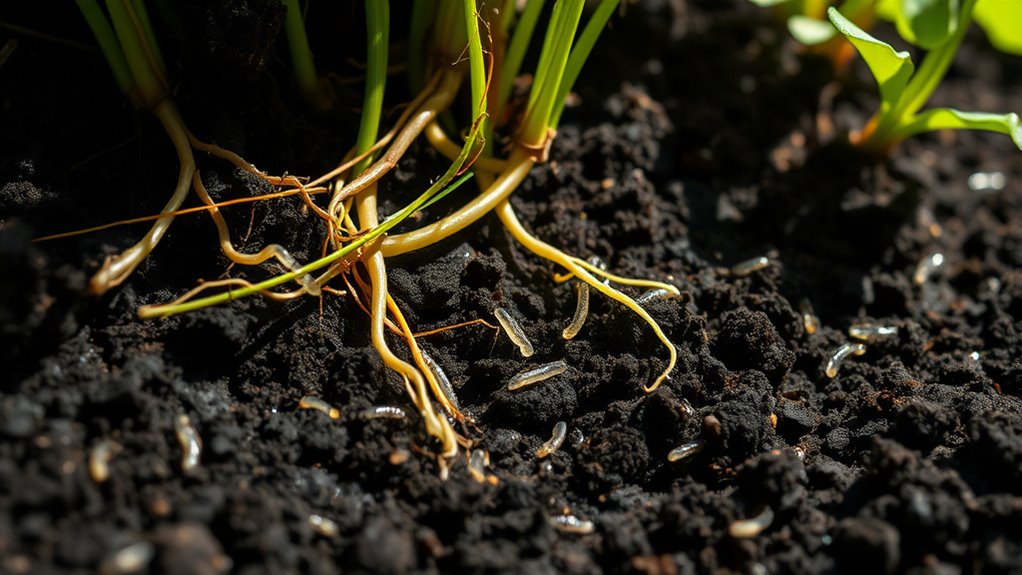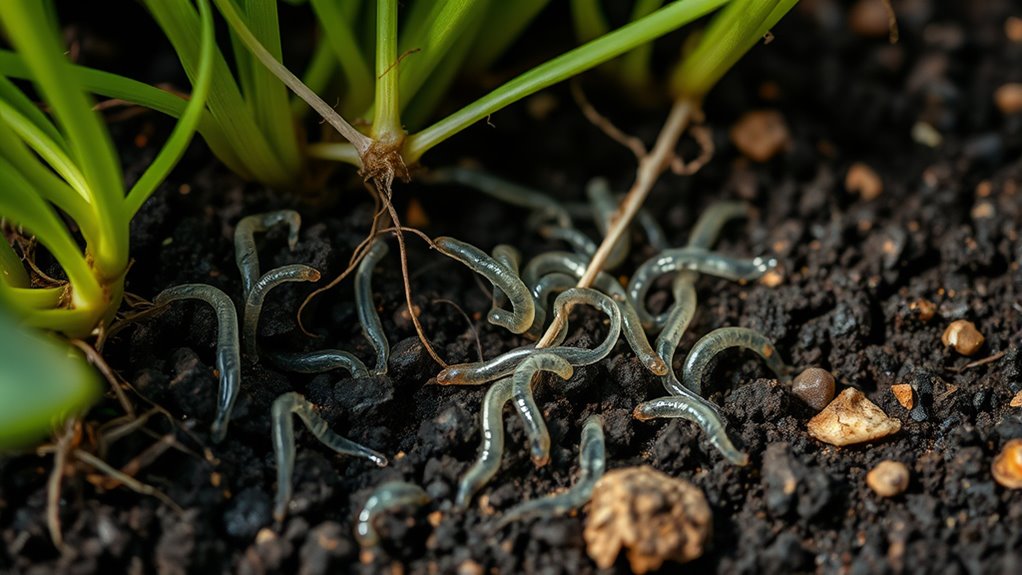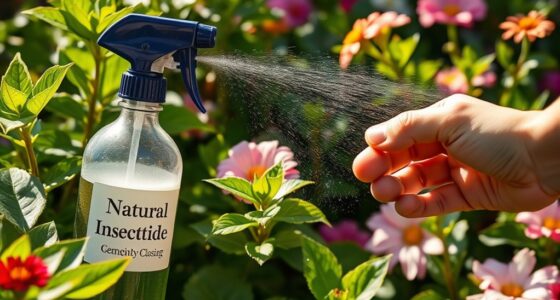Meet your garden’s bodyguards—beneficial nematodes. These tiny, natural predators live in the soil and target pests like grubs, beetles, and larvae, helping protect your plants without chemicals. They improve soil health by breaking down organic matter and supporting beneficial microbes. Easy to apply as powders or liquids, they work underground and provide long-lasting pest control. Keep exploring to discover how these natural allies can transform your garden into a thriving, pest-free space.
Key Takeaways
- Beneficial nematodes are natural soil-dwelling worms that target harmful pests like grubs and beetle larvae.
- They enhance soil health by breaking down organic matter and supporting nutrient cycling.
- Applied as powders or liquids, they quickly seek out pests and release bacteria to eliminate them.
- Safe for children, pets, and the environment, reducing the need for chemical pesticides.
- They promote a balanced, resilient garden ecosystem by controlling pests and supporting beneficial microorganisms.

Have you ever heard of beneficial nematodes? These tiny, transparent roundworms are nature’s silent allies in maintaining soil health and managing pests. Unlike chemical pesticides, beneficial nematodes offer a natural, eco-friendly pest control technique that can transform your garden’s ecosystem. They are microscopic warriors that work beneath the soil surface, hunting down harmful pests like grubs, beetles, and larvae. When you introduce beneficial nematodes into your garden, you’re essentially enlisting an army of biological pest control agents that target pests directly in their breeding grounds, reducing the need for chemical interventions.
Soil health plays a critical role in a thriving garden, and beneficial nematodes contribute considerably to this. Healthy soil supports a balanced ecosystem where beneficial microorganisms flourish, and nematodes are an integral part of this balance. They help break down organic matter and promote nutrient cycling, which in turn improves soil structure and fertility. This natural process strengthens the root systems of your plants, making them more resilient against pests and diseases. When your soil is healthy, pests have fewer opportunities to cause damage, and plants can defend themselves better. Incorporating beneficial nematodes into your pest control techniques ensures that you’re not only targeting pests effectively but also nurturing the overall health of your soil.
Applying beneficial nematodes is straightforward. You typically purchase them as a dormant powder or liquid and then apply them directly to moist soil during the right season—usually spring or early summer when pests are most active. Once in the soil, they actively seek out pests, enter their bodies, and release bacteria that kill the pests within a few days. This process is rapid and efficient, often providing immediate relief from infestations without harming your plants or beneficial insects like bees and ladybugs. Because they operate underground, beneficial nematodes don’t interfere with your plant’s above-ground growth or flower production.
Using beneficial nematodes aligns with sustainable gardening practices. They are safe for children, pets, and the environment, reducing reliance on chemical pesticides that can pollute waterways and harm beneficial insects. Plus, they’re cost-effective over time, as a single application can last for several weeks, continuously suppressing pest populations. By integrating beneficial nematodes into your pest control techniques, you’re cultivating a balanced, healthy garden ecosystem. This approach not only keeps pests at bay but also enhances your soil’s vitality, leading to more robust plants and a more sustainable gardening experience overall. Additionally, healthy soil supports a diverse range of beneficial microorganisms, including nematodes, which contribute to soil resilience and plant health.
Frequently Asked Questions
Are Beneficial Nematodes Safe for Pets and Children?
You’re wondering if beneficial nematodes are safe for pets and children. Generally, these nematodes are pest-specific, targeting only harmful soil pests and not affecting humans or animals. Their safety comes from their nematode safety profile, meaning they don’t harm pets or kids when used properly. You can confidently introduce them into your garden, knowing they won’t pose a risk to your loved ones while effectively managing pests.
How Often Should I Reapply Beneficial Nematodes?
You should reapply beneficial nematodes every 4 to 6 weeks, depending on your garden’s conditions. Application frequency depends on factors like soil moisture, temperature, and nematode lifespan, which is typically around three weeks. To guarantee continuous pest control, monitor your garden regularly and reapply when you notice pests returning or after heavy watering or rain, which can wash away the nematodes.
Can Beneficial Nematodes Control All Types of Garden Pests?
Imagine you’re battling root maggots and wonder if beneficial nematodes can help. The truth is, pest variety and nematode specificity matter. Nematodes target specific pests, so they won’t control all types. For example, some nematodes fight soil-dwelling insects but won’t impact pests like aphids or beetles. To effectively manage pests, choose nematodes tailored to the pests attacking your garden, not a one-size-fits-all solution.
Do Environmental Conditions Affect Nematode Effectiveness?
Environmental conditions definitely influence nematode effectiveness. You’ll notice that soil moisture is vital; too dry or too wet can hinder their movement and survival. Temperature sensitivity also matters—extreme heat or cold can reduce their activity. To maximize their pest control ability, make certain your soil has consistent moisture and avoid planting during very hot or cold periods. Properly managing these conditions helps beneficial nematodes work efficiently in your garden.
How Do I Store Beneficial Nematodes Before Use?
Did you know beneficial nematodes can remain effective for up to six weeks if stored appropriately? To maximize their shelf life, keep them in a cool, dark place, ideally between 39-50°F. Use recommended storage methods, such as refrigeration, and avoid exposing them to direct sunlight or extreme temperatures. Proper storage ensures they stay active and ready to protect your garden when you need them most.
Conclusion
Now that you know about beneficial nematodes, think of them as tiny warriors patrolling your garden’s underground kingdom. They’re your silent allies, quietly hunting down pests and keeping your plants healthy. With these natural defenders, you can imagine your garden blossoming like a vibrant fortress, protected from harm. Embrace their power, and watch your garden flourish as a lush, resilient oasis—nature’s own bodyguards working beneath the surface to guard your green paradise.









